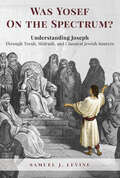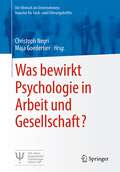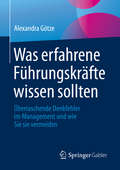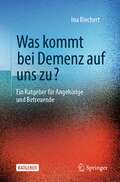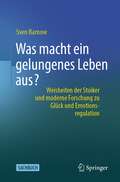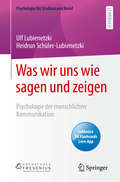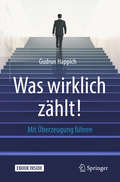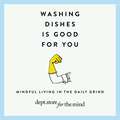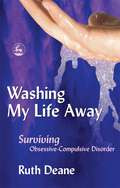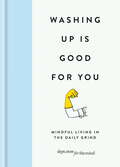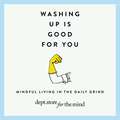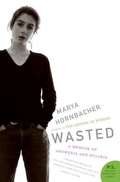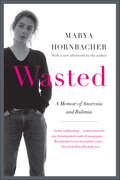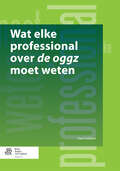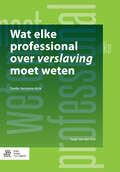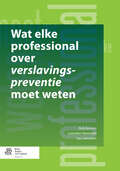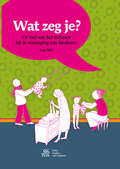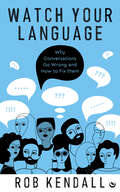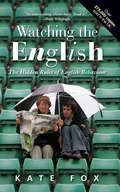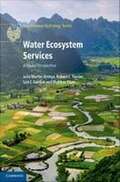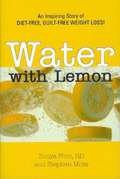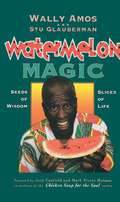- Table View
- List View
Was Yosef on the Spectrum?: Understanding Joseph Through Torah, Midrash, and Classical Jewish Sources
by Samuel J. LevineYosef's behaviors, interpersonal relationships, and personal development are often difficult to understand and seem to defy explanation. This book presents a coherent and cohesive reading of the well known Bible story that offers a plausible account of Yosef's behaviors, specifically those of an individual on the autism spectrum. Viewed through this lens, Yosef emerges as a more familiar and less enigmatic individual, exhibiting both strengths and weaknesses commonly associated with autism spectrum disorder.
Was bewirkt Psychologie in Arbeit und Gesellschaft? (Der Mensch im Unternehmen: Impulse für Fach- und Führungskräfte)
by Christoph Negri Maja GoedertierWas bewirkt Psychologie in Arbeit und Gesellschaft?Zum hundertjährigen Bestehen des IAP, dem Institut für Angewandte Psychologie in Zürich, bietet dieses IAP Jubiläumsbuch einen reflektierten Überblick sowie wertvolle Einblicke in die vielfältigen Tätigkeits- und Forschungsbereiche des IAP in der Angewandten Psychologie.Basierend auf dem Erkenntnisgewinn von einhundert Jahren zeigt es auf, wie die Angewandte Psychologie als zentrale Bereicherung für die Gesellschaft und die Arbeitswelt wirkt und wie sich die Angewandte Psychologie über diese Zeitspanne weiterentwickelt hat. Anschauliche Beispiele und fundierte Erkenntnisse von Psychologinnen und Psychologen zu folgenden Themengebieten machen diese Lektüre für jeden zu einer Bereicherung:Historie und Zukunft der psychologischen Tätigkeit am IAPPsychologische Diagnostik und BeratungFührungLehren und LernenCoachingLaufbahngestaltungOrganisationsberatung Jedes Kapitel enthält:Kurzreflexion mit Hinweisen, woher das Wissen am IAP stammtInsights in die aktuellen Tätigkeitsfelder und was das IAP bieten kannAusblick und zukunftsgerichtete TrendsZusätzlich ist das Buch mit digitalen Beiträgen, d.h. Videoclips, angereichert. Zu den HerausgebendenProf. Dr. Christoph Negri ist Leiter des IAP Institut für Angewandte Psychologie an der ZHAW Zürcher Hochschule für Angewandte Wissenschaften. Seit 2015 führt er am IAP verstärkt neue Entwicklungen im Bereich Lernen und Lehren ein und treibt den digitalen Wandel im Institut und in der Weiterbildung und Dienstleistung voran.Maja Goedertier ist Beraterin am IAP Institut für Angewandte Psychologie an der ZHAW Zürcher Hochschule für Angewandte Wissenschaften. Ihr psychologisches Wissen und Können, verbindet sie mit langjähriger Erfahrung als psychologische Beraterin.
Was die Chirurgie fürs Leben lehrt: Erfolgsrezepte eines erfahrenen Operateurs
by Rüdiger HorstmannÄrzte gelten als Halbgötter in Weiß und Chirurgen sind für viele so etwas wie die Elite der Ärzteschaft. Der Chirurg hat das Image eines Machers, er fasziniert, sein Alltag erscheint vielen unheimlich spannend und spektakulär. Schließlich verabreicht er keine Pillen, nein, er schneidet in die Haut – und das ist immer eine Grenzerfahrung.Dieses Buch ermöglicht einen Blick hinter die hermetisch verschlossenen Türen der OP-Säle. Was geht dort vor sich? Welche Fähigkeiten muss der Operateur besitzen? Wie fokussiert er sich und wie bekommt er seine Emotionen in den Griff? Fragen wie diese werden in den dreizehn Kapiteln des Buches beantwortet – und das nicht in Form theoretischer Abhandlungen oder fiktiver Geschichten, sondern anhand ganz konkreter Erfahrungen des Autors, die er in seiner über 40-jährigen beruflichen Laufbahn sammeln durfte.Und es zieht Parallelen zum Leben außerhalb der Krankenhäuser, da letztlich in jedem Unternehmen und für jeden Menschen dieselben Fähigkeiten und Eigenschaften wichtig sind: sich fokussieren und Ziele setzen, handeln und Druck von außen managen, innovativ sein und das Team einbinden. Mit den konkreten Handlungsanleitungen gelingt die Umsetzung ganz einfach im Beruf oder privaten Alltag.
Was erfahrene Führungskräfte wissen sollten: Überraschende Denkfehler im Management und wie Sie sie vermeiden
by Alexandra GötzeWährend in den Medien fortwährend neue Führungsfähigkeiten proklamiert werden, die für die Mitarbeiterführung in komplexen Arbeitswelten unverzichtbar sein sollen, beißen sich aktuell die Chefs in den Unternehmen an überraschend alten Führungsthemen die Zähne aus: Ineffiziente Meetings, in denen viel diskutiert und wenig entschieden wird. Neue Projekte, die sich in ihrer Bedeutsamkeit nahezu stündlich den Rang ablaufen und das belastende Gefühl, dass das eigene Arbeiten immer behäbiger wird, während vom Vorstand Agilität ausgerufen wird. Dieses Buch gibt einen detaillierten Einblick über drei Schwerpunktthemen, die derzeitige Führungskräften im Business Coaching besprechen, verstehen und reflektieren möchten. Drei Themen, die – trotz aller Individualität des Klientenumfelds – umfassend für die existierenden Herausforderungen aktueller Führungsarbeit stehen: Selbststeuerung, Arbeitsmethodik und Kommunikation. Themen, die – speziell von erfahrenen Führungskräften – nicht (mehr) als Stolpersteine ausgemacht werden und gerade deswegen eine besondere Beachtung verdienen. Ein Buch für Führungskräfte, die die eigenen Führungsprinzipien hinterfragen wollen oder müssen.
Was kommt bei Demenz auf uns zu?: Ein Ratgeber für Angehörige und Betreuende
by Ina RiechertEine beginnende Demenz wird oft verdrängt. Die Frage ist immer wieder: Ist das schon dement oder doch nur tüdelig? Die Menschen wollen diese Krankheit nicht wahrhaben und doch nimmt sie ihren weiteren Verlauf. Es fehlt dabei oft die Zeit und die Muße sich umfassend über Hilfsmöglichkeiten und Erleichterungen zu informieren. Dieses Buch ist ein Leitfaden für Angehörige und Betreuende und will Mut machen für einen würdevollen Umgang mit den Betroffenen. Es werden Möglichkeiten aufgezeigt, dieser Krankheit durch eine gezielte und begleitende Unterstützung im eigenen Zuhause oder einer Pflegeeinrichtung zu begegnen. Unterschiedliche Stationen werden anhand von Fallerzählungen anschaulich dargestellt und durch aktuelle medizinische und psychologische Informationen ergänzt. Praktische Tipps und Hilfsangebote für Angehörige und Betreuende runden diesen Leitfaden ab.
Was macht ein gelungenes Leben aus?: Weisheiten der Stoiker und moderne Forschung zu Glück und Emotionsregulation
by Sven BarnowIIn diesem Buch geht es darum, die Annahmen der Stoiker mit der aktuellen Emotions- und Glücksforschung zu verbinden. Das stoische Versprechen, dass mit Übung und Praxis stoischen Denkens der Mensch auch schwere Stürme des Lebens gelassen überstehen und sogar daran wachsen kann, ist ermutigend. Aber ist es auch wahr? Leser und Leserinnen, die sich für den Stoizismus interessieren und sich gleichzeitig einen gut lesbaren Überblick über die aktuelle Glücks- und Emotionsforschung verschaffen wollen, sei dieses Buch ans Herz gelegt. Aus dem Inhalt: Stoische Lebensleitlinien: Prinzip 1: Lebe fokussiert, hüte dich vor Ablenkungen. Prinzip 2: Lebe einfach. Prinzip 3: Lerne die Emotionen zu beherrschen, um glücklich zu sein. Prinzip 4: Minimiere die egozentrischen Bedürfnisse des Egos. Prinzip 5: Hinterfrage dein Verlangen nach Anerkennung. Prinzip 6: Akzeptiere, was nicht deiner Kontrolle obliegt. Prinzip 7: Übe Dich in Dankbarkeit. Über den Autor: Prof. Dr. Sven Barnow leitet den Lehrstuhl für Klinische Psychologie und Psychotherapie am Psychologischen Institut der Universität Heidelberg. Neben seinem wissenschaftlichen Engagement im Bereich der Emotionsforschung interessiert er sich für den Stoizismus, da diese Lebensphilosophie sich unter anderem mit der Frage auseinandersetzt hat: Wie Emotionen regulieren?
Was wir uns wie sagen und zeigen: Psychologie der menschlichen Kommunikation (Psychologie für Studium und Beruf)
by Heidrun Schüler-Lubienetzki Ulf LubienetzkiDieses kompakte Lehrbuch bringt Ihnen – unterhaltsam wie ein Sachbuch – die psychologischen Grundlagen der menschlichen Kommunikation näher. Sie begegnen darin wegweisenden Konzepten, Modellen und Axiomen der Kommunikation (dabei auch bekannten Namen wie Paul Watzlawick und Friedemann Schulz von Thun), unterschiedlichen Sichtweisen auf Kommunikation sowie verschiedenen Kommunikationsstilen und -mustern. Sie erfahren, was es bedeutet, erfolgreich zu kommunizieren und wodurch erfolgreiche Kommunikation erschwert oder sogar verhindert wird. Und quasi im Vorbeigehen lernen Sie, Ihre eigene Kommunikation und damit sich selbst besser zu verstehen.
Was wirklich zählt!: Mit Überzeugung führen
by Gudrun HappichAn der Spitze stehen, erfolgreich sein und sich trotzdem ohnmächtig, überfordert, unzufrieden und einsam zu fühlen – das kommt häufiger vor als manche glauben. Warum? Um Erfolg und Erfüllung verbinden zu können, benötigen wir den richtigen Platz, der unseren Stärken und Talenten entspricht. Ähnlich wie Pflanzen verkümmern wir, wenn die Rahmenbedingungen uns nicht entsprechen. Wenn wir dagegen unser (Berufs-) Leben im Einklang mit unserer inneren Überzeugung gestalten, können wir Leistung mit Leidenschaft und Leichtigkeit verbinden. In diesem Buch lernen Sie vier Top-Führungskräfte kennen. Ihre Karrieren, Ängste, Zweifel und Hoffnungen sind exemplarisch für viele andere. Begleiten Sie sie dabei, wie sie ihren persönlichen Weg zu Erfolg und Erfüllung gehen und machen Sie sich selbst auf den Weg. Sie finden dazu viele Praxis-Tipps und Übungen. Von der vielfach bewährten Vorgehensweise profitieren der Einzelne und das Unternehmen – denn Mensch und System lassen sich nicht trennen. Ein Mensch in der falschen Position kann ein ganzes Unternehmen gefährden. Andersherum: Wer wirklich überzeugt ist, von dem was er tut, hat immer Erfolg – und Spaß daran.Dieses Sachbuch ist eine Weiterentwicklung des erfolgreichen Fachbuchs "Was wirklich zählt!", Springer Gabler 2014.
Washing Dishes is Good for You: Mindfulness in the daily grind
by Dept LtdCan washing up really be good for you? Can we discover a moment of insight, a wave of calm, a tickle of delight or a tingle of connection within our simple, readily available, everyday routine? Without needing to alter our entire lifestyle, can we unearth a fresh way in, hidden inside the daily and seemingly mundane? How might we flip our thinking away from resisting and towards maybe even relishing the washing up, the cleaning and the cooking? What might this do for our body, our mind and our relationships? One everyday activity at a time, artists, designers, writers, psychologists and speakers share their stories and experiences of the everyday. You will hear of family bonding over the washing up, wondrous rituals with a cup of tea and the creation of playful households. So, yes, we are suggesting that washing up can be good for you. In fact, even more than good for you! It can be liberating, relaxing, creative and healing. These ideas are deeply embedded in some of the world's most ancient wisdom. Here, we simply explore how this way of thinking can very easily become part of our daily doing.(p) 2017 Octopus Publishing Group
Washing My Life Away: Surviving Obsessive-Compulsive Disorder
by Ruth DeaneHow many of us double check that we really have locked the door or switched off the iron? For some people, such mundane everyday worries can become life-ruining obsessions. Obsessive-Compulsive Disorder (OCD) affects one in fifty people and one of them was Ruth Deane. In this frank and personal account she shares her own experience as an OCD sufferer, from the first innocuous signs of onset to the devastating effect of the condition on her relationships with her family and friends, her self-esteem and her marriage. Ruth Deane takes the reader on a moving, honest and at times light-hearted journey, from washing her hands until they cracked and bled, to hospital admission and eventual management and recovery from OCD. This book offers hope and support to sufferers and an insight into the disorder for family, friends, professionals and all those who want or need to understand OCD and the recovery process.
Washing up is Good for you
by Dept LtdCan washing up really be good for you? Can we discover a moment of insight, a wave of calm, a tickle of delight or a tingle of connection within our simple, readily available, everyday routine? Without needing to alter our entire lifestyle, can we unearth a fresh way in, hidden inside the daily and seemingly mundane? How might we flip our thinking away from resisting and towards maybe even relishing the washing up, the cleaning and the cooking? What might this do for our body, our mind and our relationships?One everyday activity at a time, artists, designers, writers, psychologists and speakers share their stories and experiences of the everyday. You will hear of family bonding over the washing up, wondrous rituals with a cup of tea and the creation of playful households.So, yes, we are suggesting that washing up can be good for you. In fact, even more than good for you! It can be liberating, relaxing, creative and healing. These ideas are deeply embedded in some of the world's most ancient wisdom. Here, we simply explore how this way of thinking can very easily become part of our daily doing.
Washing up is Good for you: Mindfulness in the daily grind
by Department Store for the MindCan washing up really be good for you? Can we discover a moment of insight, a wave of calm, a tickle of delight or a tingle of connection within our simple, readily available, everyday routine? Without needing to alter our entire lifestyle, can we unearth a fresh way in, hidden inside the daily and seemingly mundane? How might we flip our thinking away from resisting and towards maybe even relishing the washing up, the cleaning and the cooking? What might this do for our body, our mind and our relationships?One everyday activity at a time, artists, designers, writers, psychologists and speakers share their stories and experiences of the everyday. You will hear of family bonding over the washing up, wondrous rituals with a cup of tea and the creation of playful households.So, yes, we are suggesting that washing up can be good for you. In fact, even more than good for you! It can be liberating, relaxing, creative and healing. These ideas are deeply embedded in some of the world's most ancient wisdom. Here, we simply explore how this way of thinking can very easily become part of our daily doing.
Washing up is Good for you: Mindfulness in the daily grind
by Dept LtdCan washing up really be good for you? Can we discover a moment of insight, a wave of calm, a tickle of delight or a tingle of connection within our simple, readily available, everyday routine? Without needing to alter our entire lifestyle, can we unearth a fresh way in, hidden inside the daily and seemingly mundane? How might we flip our thinking away from resisting and towards maybe even relishing the washing up, the cleaning and the cooking? What might this do for our body, our mind and our relationships? One everyday activity at a time, artists, designers, writers, psychologists and speakers share their stories and experiences of the everyday. You will hear of family bonding over the washing up, wondrous rituals with a cup of tea and the creation of playful households. So, yes, we are suggesting that washing up can be good for you. In fact, even more than good for you! It can be liberating, relaxing, creative and healing. These ideas are deeply embedded in some of the world's most ancient wisdom. Here, we simply explore how this way of thinking can very easily become part of our daily doing.(p) 2017 Octopus Publishing Group
Wasted: A Memoir of Anorexia and Bulimia
by Marya HornbacherWhy would a talented young woman enter into a torrid affair with hunger, drugs, sex, and death? Through five lengthy hospital stays, endless therapy, and the loss of family, friends, jobs, and all sense of what it means to be "normal," Marya Hornbacher lovingly embraced her anorexia and bulimia -- until a particularly horrifying bout with the disease in college put the romance of wasting away to rest forever. A vivid, honest, and emotionally wrenching memoir, Wasted is the story of one woman's travels to reality's darker side -- and her decision to find her way back on her own terms.
Wasted: A Memoir of Anorexia and Bulimia
by Marya HornbacherA classic of psychology and eating disorders, now reissued with an important and perhaps controversial new afterword by the author, Wasted is New York Times bestselling author Marya Hornbacher's highly acclaimed memoir that chronicles her battle with anorexia and bulimia.Vivid, honest, and emotionally wrenching, Wasted is the story of how Marya Hornbacher willingly embraced hunger, drugs, sex, and death—until a particularly horrifying bout with anorexia and bulimia in college forever ended the romance of wasting away.In this updated edition, Hornbacher, an authority in the field of eating disorders, argues that recovery is not only possible, it is necessary. But the journey is not easy or guaranteed. With a new ending to her story that adds a contemporary edge, Wasted continues to be timely and relevant.
Wat elke professional over de oggz moet weten
by Gert SchoutIn de Openbare Geestelijke Gezondheidszorg (OGGz) worden mensen geholpen die hulp nodig hebben maar er niet om vragen, of er niet om vragen bij het juiste adres. Vaak gaat het om combinaties van problemen en beperkingen. De belangrijkste reden dat de OGGz bestaat is echter niet de problemen of beperkingen van de doelgroep, maar het onvermogen van instanties om integrale, assertieve en grensoverschrijdende hulp te bieden. Drempels, productieplafonds, wachtlijsten en indicaties bemoeilijken de toegang tot de hulpverlening. Deze uitgave wil antwoord geven op de vraag 'wat iedere professional moet weten over de OGGz'. Het bestaansrecht van de OGGz centraal te stellen: waarom is er een OGGz? Hoe komt dat? En hoe is de OGGz buiten Nederland georganiseerd? Antwoorden op die vragen zijn echter ook van belang voor het beroepsvoorbereidend onderwijs. Dit boekje is daarom ook bedoeld voor de opleidingen die voorbereiden op eerdergenoemde werkterreinen.
Wat elke professional over verslaving moet weten: Canon Verslaving
by Jaap van der StelDit boek is onmisbaar voor alle personen die zich, professioneel of in lerende of opleidende rol, in of rond de verslavingszorg bewegen. Het is een unieke publicatie op gebied van kennisoverdracht, bekwaamheidsontwikkeling, onderwijs en opleiding. Dit gedegen overzicht van de belangrijkste onderdelen van verslaving en verslavingszorg kan beschouwd worden als canon en tegelijkertijd als 'body of knowledge' van dit vakgebied. De focus is in dit boek gericht op gebruik, misbruik en afhankelijkheid van psychoactieve stoffen, met name op alcohol, heroïne, cocaïne en cannabis. Hoewel de verslavingszorg in Nederland al meer dan een eeuw bestaat, is er niet eerder een handleiding verschenen dat specifiek voor het hoger onderwijs (m. n. HBO) is geschreven. Aan dit boek liggen geselecteerde teksten - tientallen artikelen, handboeken, richtlijnen en literatuurstudies - ten grondslag die qua actualiteit, leesbaarheid en empirische onderbouwing voldoen aan de hoge normen die de Raad voor Bekwaamheidsontwikkeling stelt. Deze Raad heeft de opdracht om 'moderne verslavingskunde' te bevorderen in opleidingen, trainingen en na- en bijscholing van professionals in de gezondheidszorg. De handleiding kent 4 hoofdstukken: Middelen, gebruik en gebruikerMisbruik en verslavingMaatschappelijke gevolgen en overheidsbeleidBehandeling en begeleiding bij verslavingOm ruimte te besparen wordt in de tekst verwezen naar websites wanneer daar uitmuntende en actuele overzichten en praktische informatie over hulpverlening staan.
Wat elke professional over verslavingspreventie moet weten
by Lex Lemmers Rob Bovens Leontien HommelsDit boek gaat over verlavingspreventie. Verslaving is een maatschappelijk verschijnsel dat vaak meer dan andere ziekteproblemen leidt tot gevolgen die verder gaan dan hogere kosten voor de gezondheidszorg. Verslavingen kunnen leiden tot ontwrichting van sociale omgevingen, tot verwaarlozing in de opvoeding, tot overlast op straat, tot economische schade, of tot onveilige situaties in het verkeer of in het uitgaansleven. Het boek wordt op eenzelfde manier opgezeg als Wat elke professional moet weten over verslaving. Het zjin korte hoofdstukken bestaande uit verschillende didactische boxen waarin termen worden uitgelegd, voorbeelden worden gegeven en verwijzingen naar andere literatuur staan opgenomen.
Wat zeg je?
by Inga MolBaby's en kleine kinderen worden heel veel aangeraakt. Ze hebben nog geen woorden. Voor het kleine kind is de aanraking letterlijk het meest veelzeggende in zijn bestaan. Het is zijn eerste taal.Hoe je die taal kunt leren verstaan én spreken, is het onderwerp van dit boek. 'Wat zeg je?' is voor iedereen die kinderen verzorgt en voor iedereen die met kinderen werkt.
Watch Your Language: Why Conversations Go Wrong and How to Fix Them
by Rob KendallThe most accessible and practical book on the market about improving your personal and professional conversations, by internationally respected conversation expert Rob Kendall.Watch Your Language makes good communication easy, offering a huge range of case studies, easy-to-absorb concepts such as the Bad Place and the Tangle, and a unique "talking heads" page design that dissects examples of problematic conversations. It explains exactly why our daily conversations go wrong, how to respond when they do and provides tips on how to stop them from deteriorating in the first place. Communications expert Rob Kendall draws on over 30 years of experience to reveal:How to avoid conversations escalating into destructive argumentsHow to prepare for and conduct challenging conversationsHow to avoid defensiveness and emotional lockdownHow to read the warning signals that a conversation is going off-trackShort digestible chapters look at a wide variety of conversational scenarios, showing how to have rewarding and effective interactions with everyone in your life – from your partner, parents and children to your colleagues, boss and neighbours.
Watching the English: The Hidden Rules of English Behaviour
by Kate FoxA runaway bestseller in the UK, Watching the English is now available in the U.S. for the first time! Witty and wise, Kate Fox reveals the quirks, habits, and foibles of the English people. Putting the national character under her microscope, Fox explores this strange and fascinating culture, governed by a complex set of unspoken rules and a bizarre code of conduct. Through anthropological analysis and a series of unorthodox experiments (often using herself as a reluctant guinea-pig), Fox discovers what these unwritten codes tell us about Englishness: the rules of weather-speak, the ironic-gnome rule, the reflex apology rule, the paranoid-pantomime rule, class anxiety tests, and the money-talk taboo, among others. Watching the English is a biting, affectionate, insightful, and often hilarious look at English society.
Water Ecosystem Services: A Global Perspective (International Hydrology Series)
by Iain J. Gordon Julia Martin-Ortega Robert C. Ferrier Shahbaz KhanThis comprehensive volume describes how ecosystem services-based approaches can assist in addressing major global and regional water challenges, such as climate change, biodiversity loss, and water security in the developing world, by integrating scientific knowledge from different disciplines, such as hydrological modelling, environmental economics, psychology and international law. Empirical assessments at the national, catchment and regional levels are used to critically appraise this systemic approach, and the merits and potential limitations are presented. The practicalities of this approach with regard to water resources management, nature conservation, and sustainable business practices are discussed, and the role of society in underpinning the concept of ecosystem services is explored. Presenting new insights and perspectives on how to shape future strategies, this contributory volume is a valuable reference for researchers, academics, students and policy makers, in environmental studies, hydrology, water resource management, ecology, environmental law, policy and economics, and conservation biology. Provides a practical definition of ecosystem services-based approaches for both researchers and practitioners. Provides a definitive reference for future research and the implementation of ecosystem services-based approaches within the water sector and beyond. Discusses new and unexplored dimensions to the ecosystem services field, such as human rights, thereby enhancing the concept for both research and practice. Brings together knowledge across a range of disciplines and is suitable for a broad audience.
Water With Lemon
by Stephen Moss Zonya FocoPower of One Good Habit Water with Lemon is the first health novel in the Power of One Good Habit series. Introducing A New Genre: The Health Novel 60 extra pounds. An unhappy marriage. Food for comfort. Karen's life is falling apart. Then she meets an unlikely neighbor who reveals how a series of simple choices have the power to shape the life we have - into the life we want. Karen's story of weight loss and personal transformation will touch your heart and open your eyes! It will reveal how eight powerful, core habits, when mastered one at a time, create an invisible force that will literally - change your life. What do you get when you cross a nutritionist with a novelist? A health novel! Where nutrition, health and weight-loss information are woven into the story. Each challenge the characters face not only teaches you what to do - it inspires you to actually do it. Zonya Foco, America's Nutrition Leader, and Stephen Moss, America's Health Novelist, have joined forces to create this exciting new genre. Stephen's compelling story will keep you turning the pages while Zonya's surprisingly simple approach to mastering weight control is revealed. You'll discover that this is not another fad diet book. In fact, it's not a diet book at all. There is no diet mentality. Nothing to calculate. And never a reason to feel guilty!
Watermelon Magic: Seeds of Wisdom, Slices of Life
by Jack Canfield Wally Amos Stu GlaubermanWatermelon Magic is talk from the soul using watermelons as a metaphor for life. Watermelons symbolize the slurpy happiness of life for Wally Amos (formerly known as "Famous Amos"). From his life experiences, Wally sees many parallels between humans and watermelons. Just as the vine connects watermelons and the umbilical cord connects mother and child, we are all connected by spirit. Wally shares his personal path to wisdom and tells how he never lost his humor, joy, and positive outlook on life in the process. He shows us how to overcome adversity and make healthy choices-how to reframe and rethink challenging situations in positive, optimistic, and uplifting terms. A master storyteller, Wally believes we all have a choice in our own happiness-no matter who we are, no matter what we've been through-and his stories will touch you at the very depth of your soul. If these ideas and beliefs speak to you, grab them like slices of watermelon, devour them, and have fun! Look out for the seeds, and live life to the fullest!
Waves of Hope: Personal Stories of ECT
by George KirovElectroconvulsive therapy (ECT) can be a lifesaving treatment for people with severe mental illness that have not responded to other treatments. Yet, it remains one of the most controversial treatments in psychiatry. This book is a collection of stories written by people who have received ECT, or by their friends and family. They provide open and detailed accounts of their experiences of severe mental illness and their journeys through ECT, including any side effects of the treatment. The outcomes range from quick recoveries to relapses and repeated courses of therapy. These stories will highlight the potential life changing benefits this treatment can have and dispel some of the myths and misinformation that surround this treatment. This book will be a useful resource for anyone looking for further information about ECT and for those who want to learn about the experiences of people who have severe depression, including psychosis.
